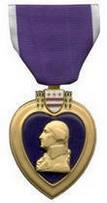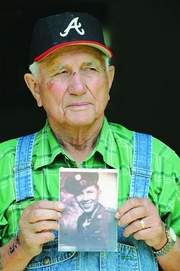

Go on, why not sponsor this page for $5.00 and have your own message appear in this space. Click here for details |
 James
Reynolds
James
Reynolds
Date and Place of Birth: 1920
Baseball Experience: Minor League
Position: Pitcher
Rank: Private
Military Unit: 76th Battalion, Field Artillery Group 406
US Army
Area Served: European Theater of Operations
(The following article was written by Frank Wallis and appeared in the Baxter Bulletin (Mountain Home, Arkansas) on June 6, 2009)
 NORFORK
— U.S. Army Field Artillery Group 406 landed on Omaha Beach around 4 p.m. 65
years ago today — D-Day — the largest military array of modern times.
NORFORK
— U.S. Army Field Artillery Group 406 landed on Omaha Beach around 4 p.m. 65
years ago today — D-Day — the largest military array of modern times.
James "Fireball" Reynolds, 89, of Norfork was there.
Reynolds said he will look back again today and think of the many American men
who died on this day, 65 years ago.
"You can't do nothin' about it," said Reynolds. "You can look back all you want,
and it doesn't have to be June 6, but what can you do?"
The first troops landed at dawn. When Reynolds hit the beach, rifle and
artillery fire were still frequent from any of 32 fortified German positions
above the beach.
"I can't tell you much about what the beach looked like," said Reynolds. "I was
running like hell. You weren't looking at the beach. You were trying to get
somewhere and get dug in."
Reynolds was with the 76th battalion in Field Artillery Group 406. His traipse
with the 76th would end nearly a year later in Stresovice, Czechoslovakia.
In-between he drove a Jeep for the officer who would direct much of the 76th
battalions' artillery fire in support of the Army's 29th Infantry.
He fought in the Battle of the Hedgerows.
Reynolds fought in the Battle for the Crossroads in Notre Dame de Cenily when a
forward infantry heavy with fresh replacements was overrun by German artillery
bringing opposing tanks and artillery face to face. It was a battle in which
substantial German artillery units were destroyed by Army artillery firing from
camouflaged positions.
Reynolds fought in the Battle of the Bulge.
He saw the aftermath of the German massacre of U.S. prisoners of war at Malmedy
as Germans fled from positions around Bastogne, Belgium, after defeat in the
Battle of the Bulge.
"More than 250 of our guys gunned down point-blank by SS machine guns," said
Reynolds. "That was the SS. They were a bunch of mean bastards. We wanted to
kill them."
Little war casualties
Throughout the war, Reynolds said he believes one of greatest and often
overlooked war casualties were the children of Europe. Many were orphaned and
all were hungry, he said.
"Everywhere we stopped the kids begged us for food. I never ate my iron
chocolate bars that came in our rations. I gave them to the kids," said
Reynolds. "Most of them spoke good English and they would come around and ask
'Can I have a bite of that?' What do you say? 'Hell no. Get out of here.'?
"Those kids didn't start the war. Hitler started it," he continued. "All of our
guys gave their rations to the kids. Who wouldn't help a kid, especially if he's
hungry?"
End of tour
When the Germans surrendered, Reynolds was with the 76th smack in the middle of
the Plzen region of Czechoslovakia, the birthplace and brewing headquarters of
pilsner ale.
"The war was over and we were tickled to death," said Reynolds. "We tapped those
vats and I think we drank all of that pilsner."
Reynolds admits he took the long way to an honorable discharge from the Army. He
said he was poor and hungry when he caught a ride to Little Rock and joined the
Army on Oct. 23, 1939.
"Times were hard and my Dad didn't have a farm," said Reynolds. So he joined and
shipped out for training in Presidio, Calif. On a full stomach, Reynolds went
absent without leave from the Army and returned to Norfork.
Reynolds says he does not advocate that kind of behavior in an enlisted man but
such were the life and times of James "Fireball" Reynolds.
Absent without leave in Mountain Home, Reynolds says he got into a brawl outside
a bar, was convicted of battery and sent to serve a year in jail at "Little
Tucker" in Little Rock in lieu of a $366 fine which he couldn't pay.
Out of jail when bombs fell on Pearl Harbor, Reynolds answered duty's call and
returned to Little Rock to report for duty. In a lineup of prospective recruits,
Reynolds said an officer asked the group:
"Anyone here have any prior military experience?"
"I raised my and said 'I do. I think I may be absent (without leave) right
now.'"
The officer called Reynolds out of the group, checked the Army record of
absentees and placed Reynolds under arrest. At a hearing the next day he faced
an inquiry with four officers.
"One of them asked me how I come to be absent from the Army.
"So, I just told them the truth: I was hungry when I joined and after I got in I
didn't particularly care for the Army."
Reynolds said he continued to explain to the officers how he felt a duty to
fight for his country after seeing newsreels of the attacks on Pearl Harbor.
"I just told them the truth, that I wanted in."
Reynolds said the officers conferred briefly in his presence and adjourned.
"One of 'em said: 'OK. You're in.' and that was it. I was in the Army."
Reynolds was honorably discharged June 13, 1947. His discharge paper shows 1,003
days of service lost under Article 107 and a lapel button issued for lost time
made good. He finished his Army tour with five Bronze Stars for campaigns of
France, Normandy, Rhineland, Central Europe and Ardenne. He also earned the
Purple Heart and the Good Conduct Medal.
Reynolds and his wife of 63 years, Maxine Sisk Reynolds, live in Norfork today
near high school baseball fields that bear his name.
Reynolds earned the nickname "Fireball" as a teen-aged substitute pitcher for a
city league baseball team in racially segregated Little Rock. An opposing player
in the black city league watching him warm up before the game said: "That young
man don't have nothin' but a fireball."
"That was it. I've been Fireball ever since," said Reynolds.
Reynolds has worked to bring resources for the sport of baseball since his
return to Norfork in 1980 following an career with Local Union 10 Iron Workers
based in Kansas City.
Reynolds pitched for six minor league professional baseball teams in a career he
says ascended because of his low ball and descended because of the high ball,
according to the bartender.
Reynolds played for Amarillo of the West Texas-New Mexico League in 1949 and won 18 games. He spent the next two seasons with Lamesa of the same league and won 10 games in 1950, followed by 15 games in 1951. With Meridian of the Cotton States League in 1952, his career stumbled as he won just four games against two losses. Reynolds was out of baseball the following two years before returning briefly to the game in 1955 and 1956.
Created June 7, 2009.
Copyright © 2009 Gary Bedingfield (Baseball in Wartime). All Rights Reserved.